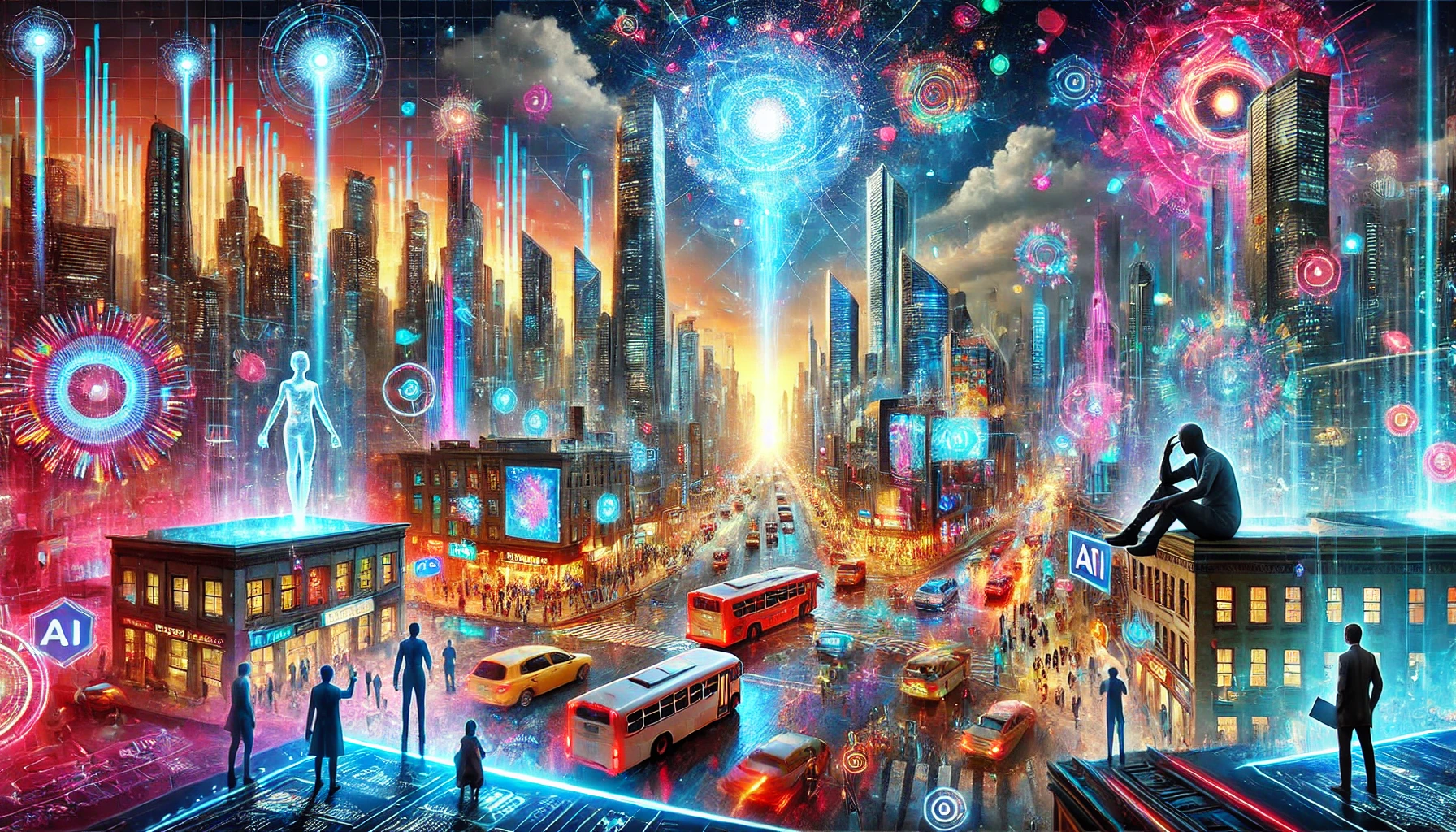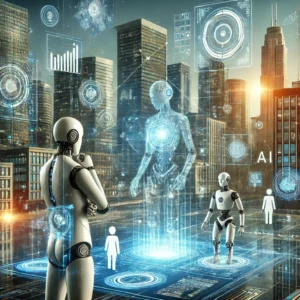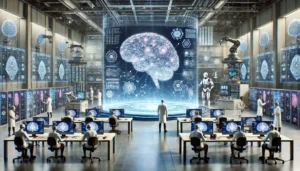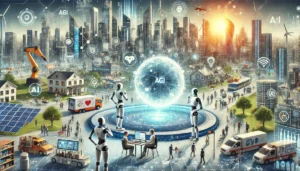Artificial Intelligence (AI) has come a long way since its inception, with machines now able to perform specific tasks with precision and efficiency. However, the holy grail of AI research lies in Artificial General Intelligence (AGI)—a system capable of understanding, learning, and applying intelligence across a wide range of tasks, similar to the cognitive abilities of humans. In this article, we will explore AGI artificial intelligence, discuss the key companies driving this revolutionary technology, and dive into the science behind AGI. Whether you’re a tech enthusiast or a business leader, this guide will provide you with valuable insights into the state of AGI and what the future may hold.
What Is Artificial General Intelligence (AGI)?
Artificial General Intelligence (AGI) refers to an AI system that can perform any intellectual task that a human can. Unlike narrow AI—which is designed to handle specific tasks like facial recognition or language translation—AGI has the ability to understand, reason, and apply knowledge across different domains. Essentially, AGI can learn and adapt from experience, making decisions based on incomplete or ambiguous information, much like humans do.
Key Characteristics of AGI:
- Autonomous Learning: AGI can learn from experience, improving its performance over time.
- Generalization: AGI can apply knowledge gained in one context to a completely different situation.
- Reasoning and Problem Solving: AGI can engage in complex reasoning, abstract thinking, and decision-making processes.
- Self-Awareness and Consciousness (Theoretical): Some theories suggest that AGI could eventually reach a level of self-awareness and even exhibit emotional intelligence, although this remains a topic of debate among experts.
Leading Companies in Artificial General Intelligence Development
Several pioneering companies are at the forefront of AGI research, developing cutting-edge technologies that may soon revolutionize various industries. Below are some of the most influential companies driving the AGI movement:
1. OpenAI
- Overview: OpenAI is one of the leading companies working on AGI. Founded by Elon Musk, Sam Altman, and others, OpenAI’s mission is to ensure that AGI benefits all of humanity.
- Key Contributions: OpenAI has made significant progress with models like GPT-3 and GPT-4, which are capable of performing complex tasks, such as natural language understanding, writing, and problem-solving. The company has emphasized creating AI systems that align with human values, ensuring safety and fairness.
- Future Vision: OpenAI’s goal is to build AGI that is safe, aligned with human goals, and robust enough to handle a wide range of activities across industries like healthcare, education, and entertainment.
2. DeepMind (A subsidiary of Alphabet Inc.)
- Overview: DeepMind is an AI research lab known for creating some of the most advanced AI systems in the world. Acquired by Google (Alphabet) in 2014, DeepMind is focused on building AI systems that can solve complex problems.
- Key Contributions: DeepMind’s breakthroughs include AlphaGo, which defeated world champions in the ancient game of Go, and AlphaFold, which revolutionized the study of protein folding—a major scientific breakthrough in biology.
- Future Vision: DeepMind is committed to developing AGI through solving more fundamental problems in AI, such as reinforcement learning, neural networks, and scalability. They envision AGI playing a critical role in addressing some of humanity’s biggest challenges, including climate change and health crises.
3. IBM
- Overview: IBM has been a key player in AI research for decades, with its Watson platform showcasing the company’s deep expertise in AI.
- Key Contributions: IBM Watson’s capabilities in natural language processing, data analysis, and machine learning have been used in various sectors such as healthcare, finance, and retail. Although Watson is not AGI, IBM continues to explore AGI principles in its research.
- Future Vision: IBM’s future research focuses on developing more advanced cognitive systems that can simulate human-like understanding and reasoning, setting the stage for AGI.
4. Anthropic
- Overview: Anthropic is a relatively new but rapidly growing AI company, founded by former OpenAI researchers. The company is dedicated to developing safe and interpretable AGI.
- Key Contributions: Anthropic has made strides in developing AI systems that prioritize safety, reliability, and human-centered design. Their focus is on creating systems that align closely with human values and avoid unintended consequences.
- Future Vision: The company is working towards AGI that can operate across a variety of domains, ensuring that these systems are transparent, understandable, and work in harmony with human society.
5. Microsoft
- Overview: Microsoft, with its significant investments in AI and cloud computing, is a key player in the development of AGI technologies.
- Key Contributions: Microsoft has partnered with OpenAI, integrating GPT-3 and GPT-4 into its products like Azure and Microsoft Office. The company’s research focuses on advancing AI’s capabilities to solve general problems and assist in real-world applications.
- Future Vision: Microsoft envisions AGI as a transformative technology for both enterprises and individuals, driving efficiency, innovation, and solving complex challenges across sectors such as healthcare, manufacturing, and education.
The Science Behind AGI: Challenges and Progress
While significant progress has been made toward AGI, creating a fully functional AGI system remains one of the most complex challenges in the field of AI research. Here are some of the scientific hurdles that must be overcome:
1. Understanding and Replicating Human Cognition
- The human brain is incredibly complex, with roughly 86 billion neurons interacting in ways we are still working to understand. Replicating this functionality in machines requires groundbreaking advances in neuroscience and machine learning.
2. Transfer Learning and Generalization
- AGI systems must learn from a variety of data and adapt to different scenarios without starting from scratch each time. While narrow AI excels at specific tasks, generalization—the ability to apply learned knowledge to new situations—is still a major obstacle for AGI systems.
3. Ethical and Safety Concerns
- As AGI approaches human-like intelligence, concerns about alignment (ensuring AGI’s goals align with human values) and control (ensuring we can control AGI’s actions) become critical. Researchers are focused on developing AI safety protocols to prevent unintended consequences and ensure AGI benefits society.
4. Computational Power
- Achieving AGI will require enormous amounts of computational power. While modern computing technology is advancing rapidly, creating truly scalable AGI systems may require even more powerful infrastructure, which brings challenges related to both hardware and energy consumption.
The Future of AGI: What Lies Ahead?
The future of AGI artificial intelligence holds immense promise but also considerable challenges. In the coming decades, AGI could revolutionize many aspects of society, from healthcare and education to governance and entertainment. Here’s a glimpse into the future possibilities of AGI:
1. AGI in Healthcare
- AGI could transform healthcare by assisting in personalized medicine, drug discovery, and diagnostics, offering quicker and more accurate treatments for patients.
2. Automation of Complex Industries
- In industries such as manufacturing, logistics, and finance, AGI could automate complex decision-making processes, leading to increased efficiency and cost savings.
3. Solving Global Challenges
- AGI’s problem-solving abilities could be instrumental in addressing global challenges such as climate change, resource management, and disease prevention, providing data-driven insights and innovative solutions.
4. Ethical AI Governance
- As AGI develops, it will be crucial to establish global frameworks for ethical AI governance to ensure that AGI is developed and used responsibly, with benefits shared across society.
Conclusion
The journey toward Artificial General Intelligence (AGI) is one of the most exciting frontiers in modern science and technology. With leading companies like OpenAI, DeepMind, and IBM at the helm, progress is accelerating, and the potential for AGI to revolutionize industries is limitless. However, there are significant scientific, ethical, and computational challenges to overcome before AGI becomes a reality.
As we continue to explore the boundaries of AI, one thing is clear: AGI is not just a theoretical concept—it’s on the horizon. By staying informed and engaged with the latest developments in AGI, we can better prepare for a future where intelligent machines work alongside humans to solve some of the world’s most pressing problems.
What do you think the future holds for AGI? Share your thoughts in the comments below, or join the conversation on Reddit to explore the latest news and trends in AGI development.




